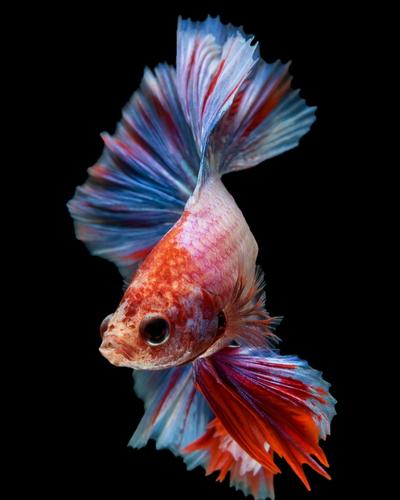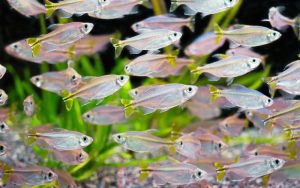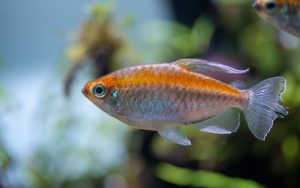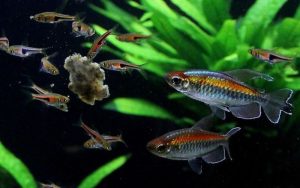Why is my betta fish not eating? You may have recently noticed that your betta fish is not eating – don’t worry!
This is common among tank owners and can usually be quickly resolved with simple at-home troubleshooting.
In this article, we’ll explore the five most common reasons your Betta is not eating and how you can remedy each issue to get them back on track and feeling their best.
We’ve done extensive research and consulted with aquarium industry experts to bring you the best advice for restoring your fish’s appetite in no time!

So, if you’re ready to learn more about why your Betta isn’t eating and what you can do about it–keep scrolling!
Table of Contents
ToggleWhy Is My Betta Fish Not Eating?
Keeping your betta fish happy and healthy relies on careful control of its environment. Poor diet, poor water quality, high or low temperature, and overfeeding can all result in a finicky appetite.
Competition betta fish with other species may also be to blame as well as immune system diseases, environmental changes, and stress caused by these conditions.
Vigilance is vital in maintaining the ideal living space for your aquatic friend!
Male betta fish are invariably hostile to one another, fiercely guarding their designated aquatic territories.
As a result of this undeniable hostility, these finned warriors must remain separated from each other fish tankmates to avoid potentially chaotic confrontations.
TOP 5 Reasons Betta Is Not Eating
Beta fish not eating? Here are the five most common reasons:
Temperature Stress
Bettas, like all fish, prefer to live in warm water. If your picky eaters’ fish tank temperature is too cold, your aquarium fish may refuse to eat. Adjust the heater and check the thermometer regularly to ensure the temperature is maintained between 74 and 79 degrees Fahrenheit.
Poor Quality Food
Many owners overlook this common cause of loss of appetite. Make sure you are feeding your Betta various live and frozen food to ensure they get all the nutrition they need! Also, only provide them with as much as they can consume within two minutes – any more than that can lead to an unhealthy build-up of uneaten leftover food in the water.
Crowding Stress
If your betta fish is stressed, it may refuse to eat even if the conditions in its tank are favorable. Consider adding plants or decorations to buffer them from any aggression or stress caused by other fish species in the fish tank.
Disease
If your betta fish has contracted a swim bladder disease or infection, it may be unable to eat due to its physical or mental pain. Common signs of illness include lethargy, lack of appetite, discoloration, and scale loss.
Overfeeding:
While many owners think overfeeding their Betta benefits their health, this can cause more harm than good. If you’ve been feeding them too often, your picky eater fish will become full and may feel like eating less!
Though many things can lead to a loss of appetite in betta fish, most of these issues are easily remedied with simple troubleshooting steps. With the help of this article, you’re now armed with all the information you need to get your aquatic pal back on track in no time!
How Long Can Betta Fishes Go Without Eating?
Betta fishes can go without eating for quite some time, but it is not recommended that they do so.
Most Bettas can last up to two weeks without food, but if their feeding habits are irregular or they are not used to long periods without food, they may only be able to last a few days.
It is important to remember that when a Betta does not eat, his health will decline, and he may eventually die.
Is It Normal for Betta Fish Not Eating for a Month?
No, it is not normal for betta fish to go without eating for a month.
Bettas require regular meals and will become very sick if they do not receive food for more than two weeks.
If your Betta refuses to eat for a month, it is essential to identify and address the underlying cause immediately.
It could be due to overfeeding, stress, or illness, and it is vital to consult a veterinarian or any nearby local fish store for proper diagnosis and treatment.
What to Do If My Betta Fish Isn’t Eating?
Bettas are a popular type of fish, but they can be hard to care for if you’re still trying to figure out what to do.
Many people buy bettas without knowing how to take care of them, and then the fish dies because it needs to get the right Betta, high-quality food, or water.
This video will show you what to do if your sick betta fish isn’t eating. We’ll cover the most common reasons why a Betta won’t eat food and how to fix the problem.
First, check the temperature of your tank. Betta fish prefer warm water, between 74-79 degrees F. If the water is too cold, your Betta may not feel like eating. Adjust the heater and check the thermometer regularly to ensure the temperature stays within this range.
If the temperature is OK, it could be due to stress or poor diet. Make sure you’re feeding your Betta a variety of live and frozen food and providing hiding spots to reduce stress.
Why My Betta Fish Is Not Eating Pellets?
Many Betta owners notice that their fish refuses to eat pellets, but there can be several reasons for this.
- The first and most common reason is that your Betta may not recognize the pellets as food. Bettas are typically used to eating live or frozen fish food, so it may take some time for them to adjust to a different diet.
- Another reason is that the pellets may need to be bigger or simpler for your fish to swallow. Try breaking them into smaller pieces, or switch to a different pellet specifically designed for Bettas.
- Lastly, it could be due to overfeeding. If you’ve been giving your Betta too much food, it won’t feel hungry and may not be interested in eating the pellets. Try cutting back on the daily food to see if that helps.
Understanding why your Betta isn’t eating pellets can help you adjust their diet and improve your health. With patience, you should soon see your Betta eating pellets with no problem!
How to Get My Betta Fish to Eat?
If your Betta fish is not eating, there are several things you can do to encourage them to start eating again.
First and foremost, ensure the water temperature in their tank is between 74-79 degrees Fahrenheit – any colder than this, and they won’t be able to digest food properly.
Second, if you’ve been feeding them the same food for a while, try mixing it up with different freeze-dried or frozen foods to make it more interesting.
Third, you can feed your Betta in a different location than usual, near the tank’s surface or in a corner, and this can help to trigger their instinct to forage for food.
Finally, you can introduce some live plants into the tank to create hiding places for your Betta. This will provide them with a sense of security and make them feel.
Why Is My Betta Fish Not Eating or Moving?
Why Is My Betta Fish Not Swimming or Eating? If your Betta fish is not moving, eating, or swimming, it could be due to various reasons. The most common causes include the following:
- Stress – Stress can occur when Bettas are placed in overcrowded tanks, lack hiding spots, and have poor water quality.
- Illness – Common illnesses like dropsy, fin rot, and swim bladder disorder can prevent your Betta from eating or swimming.
- Old Age – As Bettas age, they become less active and may not eat as much as they used to.
If you suspect that any of these factors might be causing your Betta’s lack of movement or appetite, it’s essential to take action.
To keep your pet betta fish healthy and happy, regularly check the water conditions in its aquarium. Have a test kit or strips on hand at all times – you’ll be glad you did if they stop eating!
Why Is My New Betta Fish Hiding and Not Eating?
Why is my betta fish not eating and hiding? This can signify stress or illness and should not be overlooked. A common cause of hiding and refusing to eat is the tank size.
Bettas are solitary tropical fish, so they need plenty of space to feel comfortable in their environment. If your tank is too small, it can cause them to feel anxious, which will lead to hiding and a decreased appetite.
Another possible cause of hiding and not eating could be the water parameters in your tank. Check the pH and temperature levels regularly, as Bettas prefer a neutral pH between 6.8-7.2 and temperatures between 74-79 degrees Fahrenheit.
What Is the Best Food for Betta Fish?
The best types of foods for Betta fish is a quality, high-protein diet that includes both live food and frozen foods.
Live fish foods such as brine shrimp and bloodworms are particularly beneficial as they contain essential nutrients not found in dry pellets.
Frozen foods like krill, Mysis shrimp, and daphnia should also be included in your Betta’s diet.
In addition, to live brine shrimp, mosquito larvae, and frozen foods, high-quality Betta pellets should also be offered for a balanced diet.
The ideal pellet should include omega-3 fatty acids and other essential vitamins and minerals for optimal health and vitality.
Be sure to choose a bullet designed explicitly for Bettas.
Following the tips in this article, you can help ensure your Betta fish gets all the nutrition it needs and remains healthy.
With proper care, your tropical fish will soon return to its usual appetite and enjoy meals just as much as before. Good luck!
Commonly Asked Questions about Why Isn’t My Betta Eating (FAQ)
Can My Betta Go 5 Days Without Food?
Your betta fish can remain healthy and strong for up to five days without betta food, provided the tank conditions are just right.
Can Betta Fish Survive 3 Days Without Food?
Your healthy Betta can survive up to three days without food if their tank conditions are optimal. However, if your Betta is in an overcrowded or poorly maintained Betta’s tank, it may only be able to survive for a short time.
Why Is My Betta Making Bubbles and Not Eating?
Betta fish not eating and making bubbles is usually a sign of stress, which can be caused by poor water conditions or overcrowding. To reduce stress levels and encourage eating, keeping the tank clean and well-maintained is essential.
Why Would My Betta Fish Stop Eating?
Betta fish stops eating and neglect their meals can be linked to various factors, such as an unbalanced diet, unsuitable temperatures, and overcrowding. Also, illnesses, environmental modifications, or water deficiencies could threaten these aquatic creatures’ health by causing them not to eat.
Why Is My Female Betta Not Eating?
Female betta fish may stop eating due to various environmental factors, including overcrowding, poor water conditions, and unsuitable temperatures. Additionally, illness or stress can also be a factor in why female Bettas are not eating.
Can Betta Fish Not Eating for 2 Weeks?
Betta fish not eating for two weeks is cause for concern and requires immediate attention. In this case, the water conditions and any potential illnesses or stressors that could be causing the issue should be checked.
Why Is My Betta Fish Not Eating Flakes?
Bettas may not eat flakes due to a lack of interest, as they prefer live foods over processed products. The flakes could also be expired, or of low quality, so they should be replaced.
How to Get Betta to Eat Pellets?
The best way to get a Betta to eat pellets is by introducing them gradually, starting with smaller portions and increasing over time. Also, soaking the pellets in garlic or other attractive foods could encourage your Betta to eat.
Why Is My Betta Fish Not Eating and Losing Color?
If your Betta is not eating and losing color, it could be due to an underlying illness or stress caused by poor tank conditions. In this case, it’s essential to check the water parameters in your tank and look out for any signs of illness, such as fin damage, clamped fins, or other symptoms.
Why Is My Betta Fish Laying on the Bottom of the Tank and Not Eating?
Betta fish not eating and laying at the bottom of the tank can be due to various reasons, such as illness, stress, old age, poisoning, depression, or poor water quality. If your Betta is displaying these symptoms and other signs of distress, it’s essential to seek veterinary attention immediately.
Conclusion
So, are you still asking why is my betta fish not eating? If you notice that your betta fish is not eating, there are a few potential causes. The first thing to check is the water parameters, as poor water conditions can be stressful for bettas and make them lose their appetite. Another possibility is that your fish is sick or injured, so it’s essential to keep an eye on its health and consult a pet fish veterinarian if necessary. If you rule out these other factors, it could be that your fish isn’t hungry or doesn’t like the food you’re offering. In general, Female and male bettas prefer live or freeze dried food over pellets or flakes, so try changing their diet and see if that makes a difference.
You might also like
- Do Betta Fish Float When They Die? Top 5 Reasons Bettas Die!
- Why Did My Betta Fish Die? Top 9 Reasons (Revealed)
- Closer Look at Betta Fish Behavior Before Death (Revealed)
- How Much does Betta Fish Cost? (Ultimate Buyer’s Guide)
- Do Betta Fish Need Light? – Should They Be (ON at Night)
- Can Betta Eat Tropical Flakes! (3 Better Alternatives)




